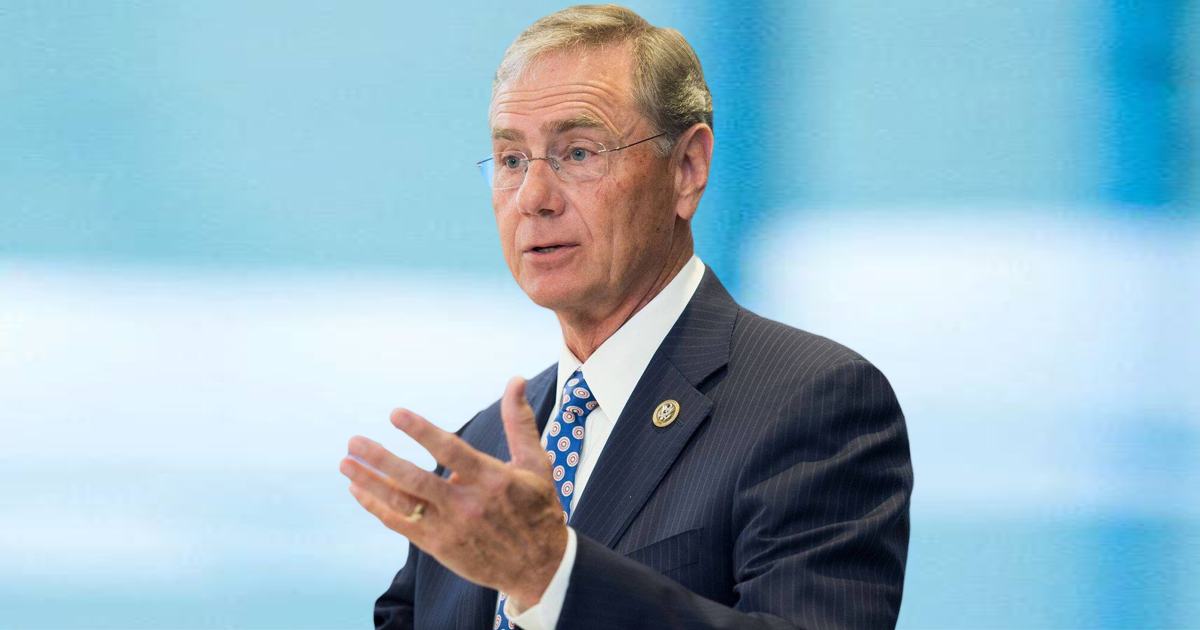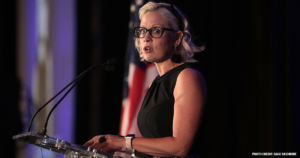By David Moore and Donald Shaw, Sludge
Days before Silicon Valley Bank and Signature Bank were swiftly shut down by regulators and the Federal Deposit Insurance Corporation (FDIC) announced it would backstop all deposits, a top House Republican on the Financial Services Committee reintroduced a bill that would remove a consumer advocate from the board of the FDIC and possibly replace them with a bank executive.
The bill, reintroduced on March 7 by Rep. Blaine Luetkemeyer (R-Mo.), would kick the director of the Consumer Financial Protection Bureau (CFPB) off the FDIC board and fill the position with someone who has worked in or supervised a bank that has less than $10 billion in assets. Called the FDIC Board Accountability Act, the bill was one of three measures introduced just ahead of this month’s bank failures by Luetkemeyer, nicknamed “Wall Street’s favorite lawmaker,” that would weaken the regulatory power of the CFPB.
The FDIC board votes on whether the failure of a financial institution such as Silicon Valley Bank would be a “systemic risk,” a verdict that means uninsured deposits, including those above $250,000, could be made eligible for federal insurance coverage. It is composed of five directors: three appointed by the president, with the advice and consent of the U.S. Senate, one of whom has experience supervising banks in a state; the Comptroller of the Currency, who is the head of a bank regulating bureau; and the director of the CFPB. Because board bylaws require that no more than three directors can belong to the same political party, the president also nominates two members of the opposing party. If Luetkemeyer’s legislation were to become law, in future FDIC board decisions when faced with a failing depository institution, a former banking industry executive could vote with two other directors—for example, the two Republican appointees—to apply a verdict of systemic risk.
“These moments involve complicated calculations about what is a giveaway to industry and what is for the public good, and the CFPB is generally good at speaking the truth in those situations,” said Carter Dougherty, communications director for the nonpartisan coalition Americans for Financial Reform. “Having the CFPB director in the room when major decisions happen sure seems like a good idea.”
Luetkemeyer’s bill would relegate the CFPB director to a non-voting observer of the FDIC board. The CFPB director, currently Rohit Chopra, is responsible for overseeing their agency’s mission, which it describes as “[making] consumer financial markets work for consumers, responsible providers, and the economy as a whole.”
A majority of the five directors atop the FDIC can help unlock enormous financial bailouts. Last week, Treasury Secretary Janet Yellen told the Senate Finance Committee, regarding the government’s decision to guarantee deposits over the $250,000 threshold for depositors in SVB and Signature, “A bank only gets that treatment if a majority of the FDIC board, a supermajority of the Fed board and I, in consultation with the president, determine that the failure to protect uninsured depositors would create systemic risk and significant economic and financial consequences.”
While members of the right-wing House Freedom Caucus have decried “big government bailouts” and released a statement opposing the lifting of the FDIC insurance cap, House Financial Services Committee Chair Rep. Patrick McHenry (R-N.C.) has been careful to keep the option open, saying he would evaluate the adequacy of FDIC insurance. Luetkemeyer told reporters this week that he was open to the idea of backstopping all deposits for 30 to 60 days. The committee is set to grill Martin J. Gruenberg, FDIC Board of Directors chairman, among other federal officials, about the pair of bank failures in a hearing on March 29.
Wall Street Favorite Attacks CFPB
With Republicans taking control of the U.S. House in the midterms, Luetkemeyer became the fifth-ranking GOP member on the Financial Services Committee, a perch he’s used to lob attacks on the CFPB, which he calls the “most economically dangerous government agency.” This year, he was tapped to chair the Subcommittee on National Security, Illicit Finance, and International Financial Institutions.
Luetkemeyer originally introduced the FDIC Board Accountability Act in December 2021, when it garnered 23 House Republican co-sponsors—which was every other Republican member of the Financial Services Committee at the time.
A recent missive from Luetkemeyer pinned the blame for the SVB and Signature Bank collapses on the companies, “one investing in a weakening tech industry and the other with deep ties to crypto currencies,” without mentioning the banking industry’s army of lobbyists that in 2018 pushed through a bill weakening supervision of institutions like SVB and Signature Bank. Led by a lobbying push from the American Bankers Association, Congress passed a bill from Sen. Mike Crapo (R-Idaho) that raised the threshold for stricter oversight to institutions with $250 billion and over, benefiting mid-size and large banks like SVB while smaller community banks appeared as the face of the campaign. The previous threshold had been $50 billion in combined assets, meaning that both SVB and Signature Bank, which had assets between $50 billion and $250 billion, were among the dozens of mid-size banks that benefited from the deregulation.
Luetkemeyer’s reputation as an ally of the banks is well earned: over his career, the employees and PACs of commercial banks have been his second-largest donor industry, according to OpenSecrets, approaching $1.5 million contributed. His personal ties to the banking industry run deeper, with his family having owned a local Missouri bank, St. Elizabeth Bancshares. Leutkemeyer previously owned a stake in the bank’s S corporation that he disclosed in 2020 as being worth between $5 million and $25 million, though his financial disclosure for 2021 says he “sold 100%” of his shares, which he valued at between $1 million and $5 million, on the final day of the year. His brother Brice was the president and CEO of the bank, which was acquired by Missouri’s Friendship Bancshares, and his spouse was on its board of directors. Luetkemeyer took millions of dollars in pass-through income from his family-held bank while serving in Congress, inviting bank lobby group officials to testify in front of the Financial Institutions and Consumer Credit Subcommittee when he chaired it in 2017.
Millions in Banking Industry Donations
Luetkemeyer is one of four Republicans atop the Financial Services Committee who have been among the top House recipients of commercial banking industry donations for the past three election cycles.
Along with McHenry, as well as Rep. Andy Barr (R-Ky.), who chairs a subcommittee overseeing banks, and Rep. French Hill (R-Ark.), who chairs a subcommittee with jurisdiction on financial inclusion, Luetkemeyer voted in favor of the 2018 Crapo deregulation bill. Combined, the four GOP lawmakers’ campaigns have received nearly $3.3 million in commercial banking cash since the 2018 cycle, according to counts from OpenSecrets. Several other Republicans on the Financial Services body were leading recipients of banking industry donations among House members in the 2022 midterm election, including Rep. Bill Huizenga of Michigan, Rep. Ann Wagner of Missouri, and Rep. Tom Emmer of Minnesota.
The chair of Signature held a fundraiser for McHenry this month at its New York headquarters, about 10 days before the bank was seized, according to a Bloomberg report. McHenry said this week he had returned all donations from the event.
The FDIC board also discusses rule changes for larger banks that spend millions of dollars every year on lobbying. During an open meeting in October 2022, they discussed a proposed rulemaking on the long-term debt requirements for banks with more than $250 billion in assets, among other supervisory and accounting issues.
In the wake of this month’s bank collapses, a new lobbying push has sprung up, with midsize banks arguing to federal officials that all bank deposits above $250,000 should be guaranteed by the government, under one proposal for two years. In a reversal from her previous statements, Treasury Secretary Janet Yellen said this week that such protections could be extended to smaller banks.



